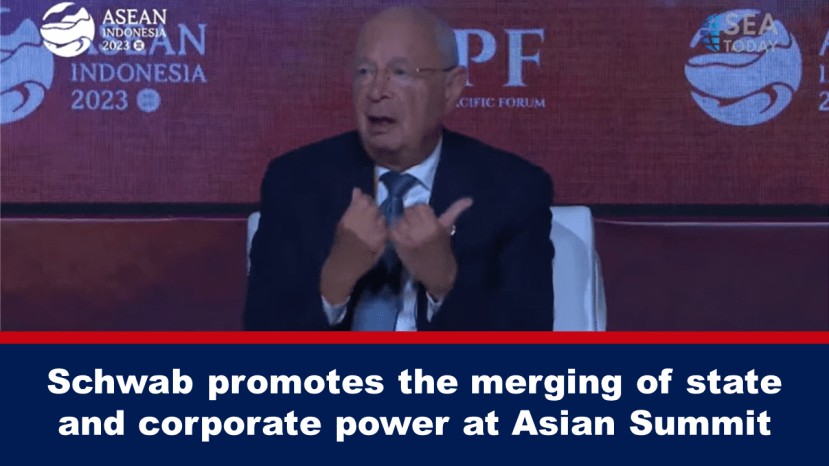Schwab promotes the merging of state and corporate power at Asian Summit
Earlier this week, Klaus Schwab was given a platform at the ASEAN Summit, a meeting of Southeast Asian governments. He took the opportunity to promote the merging of state and corporate power. Why was the head of a non-governmental organisation which represents private corporate interests even there?
Let’s not lose touch…Your Government and Big Tech are actively trying to censor the information reported by The Exposé to serve their own needs. Subscribe now to make sure you receive the latest uncensored news in your inbox…
The Association of Southeast Asian Nations (“ASEAN”) has ten Member States. As well as establishing “dialogue partners” with many other countries – including “comprehensive partnerships” with Australia, India and China – ASEAN has established partnerships with organisations such as the United Nations (“UN”) and UN Specialised Agencies.
The ASEAN Summit, which is held biannually, is the highest policy-making body in ASEAN comprising the Heads of States or Government of ASEAN Member States. It should raise eyebrows then that Klaus Schwab, who does not represent any country let alone a country in Southeast Asia, made an appearance at the latest Summit held in Indonesia.
The 43rd ASEAN Summit was held in Jakarta from 5 to 7 September 2023. On its website, the Summit is described as “bilateral meetings between the leaders of the attending countries.” Yet Schwab, who represents large corporations, muscled his way in.
As Australian politician Craig Kelly tweeted yesterday: “Why is Klaus holding court at the current ASEAN summit in Indonesia? And why is Klaus also advocating for a merger of state and corporate power?”
Speaking at the ASEAN Summit on Tuesday, Schwab said that with the fusion of corporation and state, what he calls “public-private cooperation,” we would see a shift from “the era of capitalism to the era of talentism,” where innovation becomes the “key competitive factor.” He had already explained that in merging the corporations and state, “governments still provide direction but business provides the innovative power.”
Schwab was littering the stage at the 2022 ASEAN Summit as well. As with this year, questions were raised then as to why an unelected leader of the World Economic Forum, a non-governmental organisation, is present among democratically elected officials.
Immediately after the 2022 ASEAN Summit, Schwab was cosying up to government officials once again at the Business 20 Summit (“B20”) in Bali. This is the same B20 Summit where the Indonesian Health Minister, Budi Gunadi Sadikin, spoke about a global surveillance system for pathogens. “These pathogens need surveillance systems like when you are being attacked by aliens out of the country,” he said.
Sadikin then told the businessmen present that there was money to be made. “This is an opportunity for you to move into biotechnology,” he said. “Because this [pathogen enemy] is the biggest threat [to] humanity. So, people, the government, will politically be push[ing] to spend into this sector.”
The people will not be pushing for “spend into this sector” because biotechnology is not only a threat to humans but a threat to all life on Earth – it should be outlawed. The harms and deaths caused by covid injections provide sufficient proof of that.
B20 is the official forum for the Group of 20 (“G20”) dialogue with the global business community. It is yet another organisation that is blurring the lines between public and private interests and pushing the world closer to the ideology of a world run by unelected businessmen. This was the very world system Schwab envisioned in 2019.
The World Economic Forum, not national governments, has been the leading proponent of the Fourth Industrial Revolution. Talking about who would command his dystopian Fourth Industrial Revolution during an interview with India Today, Klaus Schwab said he believed that it would be a system of stakeholder capitalism:
“I believe that state capitalism in the short term. In the short term, it provides certain advantages because you can mobilise, in a concentrated way, a lot of resources to reach a specific objective. But I believe that the future is not state capitalism or shareholder capitalism, the future is what I call stakeholder capitalism which is combined with the social responsibility,” he said.
Schwab’s stakeholder capitalism system is one where companies seek long-term value creation instead of short-term profits and governments cooperate with them. In other words, the for-profit companies are in charge.
In 2021 Schwab released a book ‘Stakeholder Capitalism: A Global Economy that Works for Progress, People and Planet’ to sell his ideology. To promote the book, various global commentators gathered for a “discussion” about it.
Among those endorsing the book in anticipation of its release were political and business leaders. These included the CEOs of Microsoft, Salesforce, Tata Sons, Grupo Santander and Bank of America, and the Prime Ministers of Belgium and the Netherlands, Alexander De Croo and Mark Rutte. And cellist Yo-Yo Ma, Jane Goodall (Founder of the Jane Goodall Institute, and UN Messenger of Peace) and Oxfam Director Gabriela Bucher also praised Schwab’s soon-to-be-released book. That the supporters of this ideology came from politics, business and non-governmental organisations (“NGOs”) is not surprising.
As Iain Davis noted in a 2022 article:
The [International Rules-Based Order] can more accurately be described as a vehicle for a worldwide stakeholder capitalist network to manipulate nation-states in pursuit of its own predominantly private, corporate agenda. Indeed, we might argue that is all it has ever been.
A truly global network of corporations, think tanks, private foundations, intergovernmental organisations, NGOs and governments work in partnership to convert global policy agendas into policy and legislation at the national and local government level. This is the Global Public-Private Partnership (“G3P”) and its reach extends to every nation.
Technocracy: The Operating System For The New International Rules-Based Order, Iain Davis, 22 February 2022

This article has been archived for your research. The original version from The Exposé can be found here.



